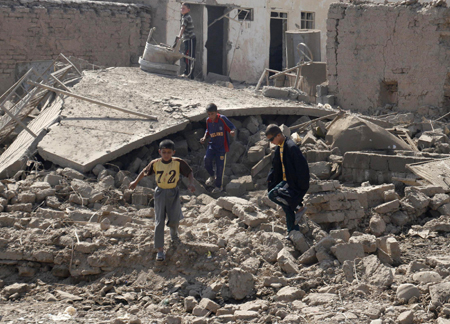At least 25 people were killed and some 75 others injured in a series of bombings across Iraq Thursday, shaping a setback to the efforts of the Iraqi government to restore normalcy in the country ahead of the next January national polls.
 |
|
Iraqi boys gather at the site of a bomb attack near Mosul, 390 km (240 miles) north of Baghdad, Sept. 10, 2009. A suicide bomber drove a truck packed with explosives into a Kurdish village in north Iraq before dawn on Thursday.[Xinhua] |
The most deadliest blast in the day was in northern Iraq when a suicide bomber drove an explosives-packed truck bomb and blew it up among clay and stone houses after midnight in the village of Wardek, some 390 km north of Baghdad.
The powerful blast killed 20 people, including ten from one family, and wounded some 30 others, the source said.
The blast, which took place while families were sleeping, flattened several nearby houses and caused severe damages to more than 40 others, the source added.
Residents and rescue teams retrieved many bodies and removed wounded people who were buried under the debris of demolished houses, he said.
Another truck bomber was killed by local Kurdish Peshmerga forces before he could detonate the second blast.
The bomb seems to be well-designed to foment up already existing tensions between Kurds and Arabs, who are vying for land and resources.
Nineveh province remains one of Iraq's most volatile area despite the dramatic drop of violence in Iraq over the past two years.
Analysts say tensions between Arabs and Kurds in northern Iraq is the major threat to the country's stability and security as the US troops, which have mediated between the two sides, are prepare to withdraw from Iraq by 2012.
In August, General Ray Odierno, the top US troops commander in Iraq, said discussions were under way for a possible agreement between the Iraqi government in Baghdad and the Kurdish regional government to make their respective armies to work with the US troops to control the disputed zones outside the Kurdish region. The US proposal also includes parts of the volatile Diyala province.
In Diyala province, a mayor of the town of Sa'diyah, some 120 km northeast of Baghdad, escaped unhurt a suicide car bomb attack on his convoy Thursday, while a civilian was killed and eight others wounded in the attack, a provincial police source said.
Ahmad al-Karkushi, survived the attack when a suicide bomber drove an explosive-laden car into Karkushi's convoy while travelling in central Sa'diyah, the source said.
Four of Karkushi's bodyguards were among the wounded, he said.
A resident looks at a destroyed building and damaged vehicles after a bomb attack near Mosul, 390 km (240 miles) north of Baghdad, Sept. 10, 2009.[Xinhua]
The blast destroyed three vehicles of Karkushi's convoy and four nearby civilian cars, along with causing damages to five houses, the source added.
Diyala province, which stretches from the eastern edges of Baghdad to the border with Iran, has long been a stronghold for al-Qaida militants and other insurgent groups since the US-led invasion of Iraq in 2003 despite repeated US and Iraqi military operations against them.
In south of Baghdad, twin bomb explosions ripped through a crowded marketplace in the town of Mahmoudiyah, some 30 km south of Baghdad, killing four people and wounding 29 others, the police said.
The two explosive charges detonated simultaneously during rush hour in the morning in the popular market, damaging several nearby shops and many stalls, they said.
In Baghdad, a roadside bomb went off at Karradah district in central the capital, wounding two policemen and six civilians, the police said.
Also in the day, a roadside bomb detonated near a US patrol travelling on the main road near the Nafaq al-Shurtah area in western Baghdad, they said, adding that there were no reports about whether the US troops sustained any casualties.
Iraqi and US officials frequently warned that violence will increase ahead of the country's parliamentary elections slated for January 2010. The elections will be a key test for Iraq's fledgling democracy and its security forces.
The recent spate of violence in Iraq renewed doubts over the capability of the Iraqi security forces to maintain security after the US troops pulled out of Iraqi cities and towns, in line with an agreement inked late last year between Baghdad and Washington.
(Xinhua News Agency September 11, 2009)